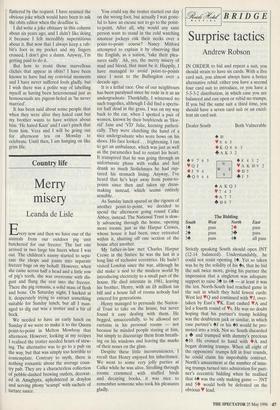Country life
Merry misery
Leanda de Lisle
Every now and then we have one of the animals from our outdoor pig unit butchered for our freezer. The last one arrived in two large bin liners when I was out. The children's nanny started to sepa- rate the chops and joints into separate freezer bags on my behalf. However, when she came across half a head and a little row of pig's teeth, she was overcome with dis- gust and flung the rest into the freezer. There the pig remains, a solid mass of flesh and bone. On Saturday night, I hacked at it, desperately trying to extract something suitable for Sunday lunch, but all I man- aged to dig out was a trotter and a bit of hock.
We needed to have an early lunch on Sunday if we were to make it to the Quorn point-to-point in Melton Mowbray that afternoon. However, looking at my recipes I realised the trotter needed hours of stew- ing. The alternative was to go to a pub on the way, but that was simply too horrible to contemplate. Contrary to myth, there is nothing romantic about the average coun- try pub. They are a characterless collection of pebble-dashed brewing outlets, decorat- ed in Anaglypta, upholstered in draylon and serving phony 'scampi' with sachets of tartare sauce. You could say the trotter started our day on the wrong foot, but actually I was grate- ful to have an excuse not to go to the point- to-point. After all, why would any sane person want to stand in the cold watching amateur jockeys risk their necks over a point-to-point course? Nancy Mitford attempted to explain it by observing that the English, as a nation, 'take their plea- sures sadly'. Ah, yes, the merry misery of mud and blood, that must be it. Happily, I have managed to avoid point-to-points since I went to the Bullingdon over a decade ago.
It is a lethal race. One of our neighbours has been paralysed since he rode in it as an undergraduate. Thankfully, I witnessed no such tragedies, although I did find a specta- tor half dead in the grass. I was on my way back to the car, when I spotted a pair of women, known by their boyfriends as 'Hor- rid' Jane and 'VD' Julie, keening patheti- cally. They were clutching the hand of a nice undergraduate who wore bows on his shoes. His face looked. .. frightening. I ran to get an ambulance, which was just as well as the paramedics had to restart his heart. It transpired that he was going through an unfortunate phase with vodka and had drunk so much Stolichnaya he had nip- tured his stomach lining. Anyway, I've heard that he's kept away from point-to- points since then and taken up dress- making instead, which seems entirely sensible.
As Sunday lunch spared us the rigours of another point-to-point, we decided to spend the afternoon going round Calke Abbey, instead. The National Trust is slow- ly advancing through the house, opening more rooms, just as the Harpur Crewes, whose house it had been, once retreated within it, shutting off one section of the house after another.
My father-in-law met Charles Harpur Crewe in the Sixties: he was the last in a long line of reclusive eccentrics. He hadn't visited London since the war, although he did make a nod to the modern world by introducing electricity to a small part of the house. He died intestate in 1981, leaving his brother, Henry, with an 18 million tax bill and a house full of rooms nobody had entered for generations. Henry managed to persuade the Nation- al Trust to take on the house, but never found it easy dealing with them. He begged, unsuccessfully, to be allowed net curtains in his personal rooms — not because he minded people staring at him, but simply to discourage them from breath- ing on his windows and leaving the marks of their noses on the glass.
Despite these little inconveniences, I recall that Henry enjoyed his inheritance. We went to some very jolly parties at Calke while he was alive. Strolling through rooms crammed with stuffed birds and decaying books, it was nice to remember someone who took his pleasures gladly.


























































 Previous page
Previous page